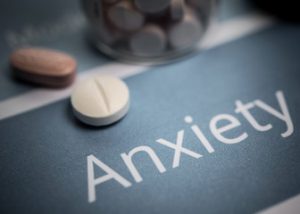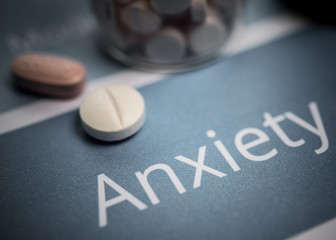Anxiety-related disorders are very common. It has been estimated that nearly 28.8% of adults experience anxiety at some point in their life (Kessler et al., 2005). It is one of the main reasons why treating anxiety is not easy. Anxiety has different symptoms, varying pain thresholds, unpredictable reactions to the medication, and so on. There are three approaches that are usually recommended for anxiety relief – psychotherapy, lifestyle changes, and medication. All three are not always simultaneously used for anxiety relief. For some patients, an effective psychotherapy session alone works, while for another patient, a combination of therapy and medication works simultaneously. For yet another patient, exercising, diet control, and lifestyle-related changes work as anxiety relief without side effect.

Medication for Anxiety Relief
What Causes Anxiety
Anxiety can be a heart-pounding panic, sleepless nights, unprecedented fear, inability to eat right, drinking incessantly, and more. Anxiety can be caused by many things.
- Surrounded by unknown people, an unfamiliar environment,
- Fear of public opinions,
- Ill-treatment by family and friends,
- Fear of failing,
- Inability to meet expectations, and much more
For many suffering from anxiety, relief is their only solution. Some want immediate relief, and some hesitate to ask for relief, some fear antidepressants. But relief is important and necessary. If you are able to get relief, anxiety, and panic attacks will lessen. You will be able to be more focused on your work, you will be able to face difficult situations, and you will be able to lead a normal life.
What Are the Options for Anxiety Relief?
As mentioned above, there are different things that can work for anxiety relief – and which, in fact, are prescribed all over the world. Let’s take a detailed look at them once again.
- Psychotherapy– Therapy is considered to be very effective in anxiety relief. The most widely used psychotherapy is cognitive-behavioral therapy or CBT. It is considered to be the most effective treatment for anxiety-related disorders, phobias, panic disorders, etc. Therapy can be time-taking. A patient also needs to put in a lot of effort to successfully react to the therapy. It isn’t always easy for many patients to do so.
- Lifestyle Changes– Making lifestyle changes can control anxiety to a large extent. In fact, almost all doctors recommend that patients make lifestyle changes, irrespective of the fact that a patient needs therapy or medication. There can be several changes that a person can bring to his life in order to control anxiety and panic.
- Eating a healthy, well-balanced diet,
- Having a good night’s sleep,
- Exercising daily by walking, jogging, yoga, going to the gym,
- Staying away from people who have a negative impact on your life and decisions,
- Picking up a new hobby so as to remain occupied but relaxed
- Medication – Medication for anxiety relief should never be seen as a quick-fix solution. It isn’t. In most cases, medication can only ease symptoms, but nothing can completely cure the mental condition. One of the prominent dangers of taking antidepressant medicines is that they come with a lot of side effects. The most common side effects include drowsiness, slurred speech, dizziness, stomach problems, headache, blurred vision, incoherence, and more. Doctors will rarely recommend patients to continue with antidepressant medications for a prolonged period of time. They aren’t good for the overall health of a person.
Effectiveness of Alternative Medicines
Antidepressants aren’t the only medicines for anxiety relief. There are several alternatives, natural medicinal options that have minimal side effects. These medicines act more as supplements and have a positive effect on anxiety and stress. However, they cannot be treated as antidepressants and cannot be used entirely as medicinal pills. It is important to remember that alternative supplements only work when a person also makes lifestyle changes, goes for therapy (if necessary), and also meditates. If you are wondering how to meditate for anxiety relief, all you need to do is have these pills, calm and relax, close your eyes and concentrate for a few uninterrupted minutes. It can be really effective.
Stress-relieving supplements are most often made using a combination of several naturally occurring ingredients. They have, for thousands of years, been seen to be effective in curing stress and anxiety. Let’s take a look at some of the most common ingredients used in mood support supplements.
- Ashwagandha – It is considered to be one of the most effective stress relievingAyurvedic medicines of all time. When used in the right proportion and mixed with equally beneficial ingredients, it can really help anxiety and stress.
- B-Vitamins–There are many compounds that complete the group of B-Vitamins. There are both primary as well as secondary compounds that have an overall effect on relieving stress.
- Gamma-Aminobutyric Acid or GABA – It is known to be one of the most effective inhibitory neurotransmitters that can help calm a distressed mind. It basically works on the blocked nerves that often trigger anxiety attacks.
- St. Johns Wort – The main purpose of using St. John’s Wort in any stress-relieving supplement is to normalize the serotonin levels that often get erratic and can have an adverse effect on one’s mood.
- Chamomile Extract – Chamomile is a soothing herb known to be a stress reliever. It is not only used in supplements, but Chamomile tea is quite popular too. It is composed of several things such as hydroxylates, phenols, flavonoids, and sesquiterpene essential oils, which together work on people with mild anxiety.
- Kava: Another alternative medicine for anxiety relief is Kava. Kava, scientifically known as, Piper methysticum is a tropical plant species that originates in the islands of the pacific ocean. The plant is used to help with sleep, anxiety, depression, and muscle tension. You can read more at Kava Guides to find out how you can get the plant.
Anxiety is not easy to deal with. It has so many layers that for a patient to understand, rationalize, and take actions is not always easy. In other words, it isn’t easy to deal with anxiety. That’s why it is important to share your insecurities, your concerns with your loved ones. But if you are looking for a quick, one-line answer to the question of what is anxiety relief, it isn’t easy to say. There are many things that work in tandem to treat anxiety. But most importantly, it is the willingness of the patient to recover from anxiety attacks, to take his medications on time, to slow down his pace, to take time out, and to live a healthy happier life.








